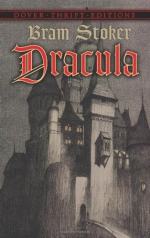|
|
Dracula Topic Tracking: Religion/Religious Duty
Chapters 1-4
Religion/Religious Duty 1: Jonathan's religiousness is established early when he hesitates to take a crucifix from a peasant woman as a lucky charm. She is trying to protect him from the evil that awaits him, but he is still holding onto a strong Western religious ideal.
Religion/Religious Duty 2: After one night in Dracula's presence, Jonathan begins praying to God. Later in the story, the main characters' devotion to God is their power.
Chapters 5-8
Religion/Religious Duty 3: The captain of the Demeter uses a crucifix, unsuccessfully, to protect himself from the Count.
Religion/Religious Duty 4: Seward recognizes Renfield's disease as one of religious mania. Renfield believes that Dracula is his god, and by obeying the Count he will gain eternal favor. Seward himself laments the folly of confusing mortal man with God.
Religion/Religious Duty 5: Renfield is drawn to his Master, and risks health and freedom by escaping from the asylum to throw himself under Dracula's command. Essentially, Dracula has come to London to make a new race of man, with he himself as the new god. This gives the book an apocalyptic aura.
Chapters 9-12
Religion/Religious Duty 6: The nun that treats Jonathan in Budapest refuses to tell Mina what Jonathan has been saying, claiming that "the ravings of the sick" are "the secrets of God." The nun, motivated in part by a sense of privacy, is also scared of the evil world of which Jonathan spoke.
Religion/Religious Duty 7: When Van Helsing keeps Arthur from kissing the dying Lucy, he expresses concern for Arthur's soul. Van Helsing is not so concerned with keeping his friends alive as much as he is with keeping them in God's favor. What remains of the 'good' Lucy recognizes this danger, and thanks Van Helsing for the intervention, making him promise to protect Arthur. Here we see Van Helsing becoming the religious as well as intellectual leader.
Chapters 13-16
Religion/Religious Duty 8: When Van Helsing rallies the group, he tells them that they must do their "duty". He sees the task ahead of them as not merely a personal war, but a Christian obligation.
Religion/Religious Duty 9: All of the men are religious. Van Helsing, who still has not convinced everyone of his purpose, believes that God must be used to fight the devil. Therefore, he uses the Host, the sacred Wafer eaten at communion, to seal Lucy's tomb. The others never for a moment believe that Van Helsing is being sacrilegious. On the contrary, Van Helsing's use of such a sacred object convinces the men that there must be some validity in what he is doing.
Chapters 17-20
Religion/Religious Duty 10: When Van Helsing asks everyone to pledge themselves to the cause of eradicating Dracula, he uses the terminology of a religious crusade. He explains that there is more than life at stake - that the fate of Christianity and the world is in their hands. He also attempts to scare them, presumably to insure that only those who are serious will commit. To scare them, he points out that, if they do not succeed, they do not die a glorious death in God's name, but instead become devils themselves, "an arrow in the side of Him that died for man."
Chapters 21-23
Religion/Religious Duty 11: Mina, aware of the dangers she poses to herself, her friends, and her husband, and her chances of getting into heaven, considers committing suicide. Van Helsing reminds her that this action will not save her soul. She is locked into the fight regardless, bound by religious obligation.
Religion/Religious Duty 12: We see the transformation of Mina represented not by becoming 'voluptuous," like Lucy, but by becoming 'unclean' in the eyes of God. The mark left on her forehead by the holy Wafer becomes the symbol of everyone's duty, the danger they are fighting against and the necessity of fighting against it.
Chapters 24-27
Religion/Religious Duty 13: Van Helsing uses the Wafer, i.e., the power of the Church, as both a way to keep the evil women out and as a way to keep Mina trapped in. He leaves her trapped in a circle of wafer while he sanitizes the castle, figuring that it is better for her to be vulnerable to wolves than to vice.
Religion/Religious Duty 14: Quincey, in his dying words, points out that they have won by pointing out that Mina's wound has healed; in other words she is once again in the good graces of God.




